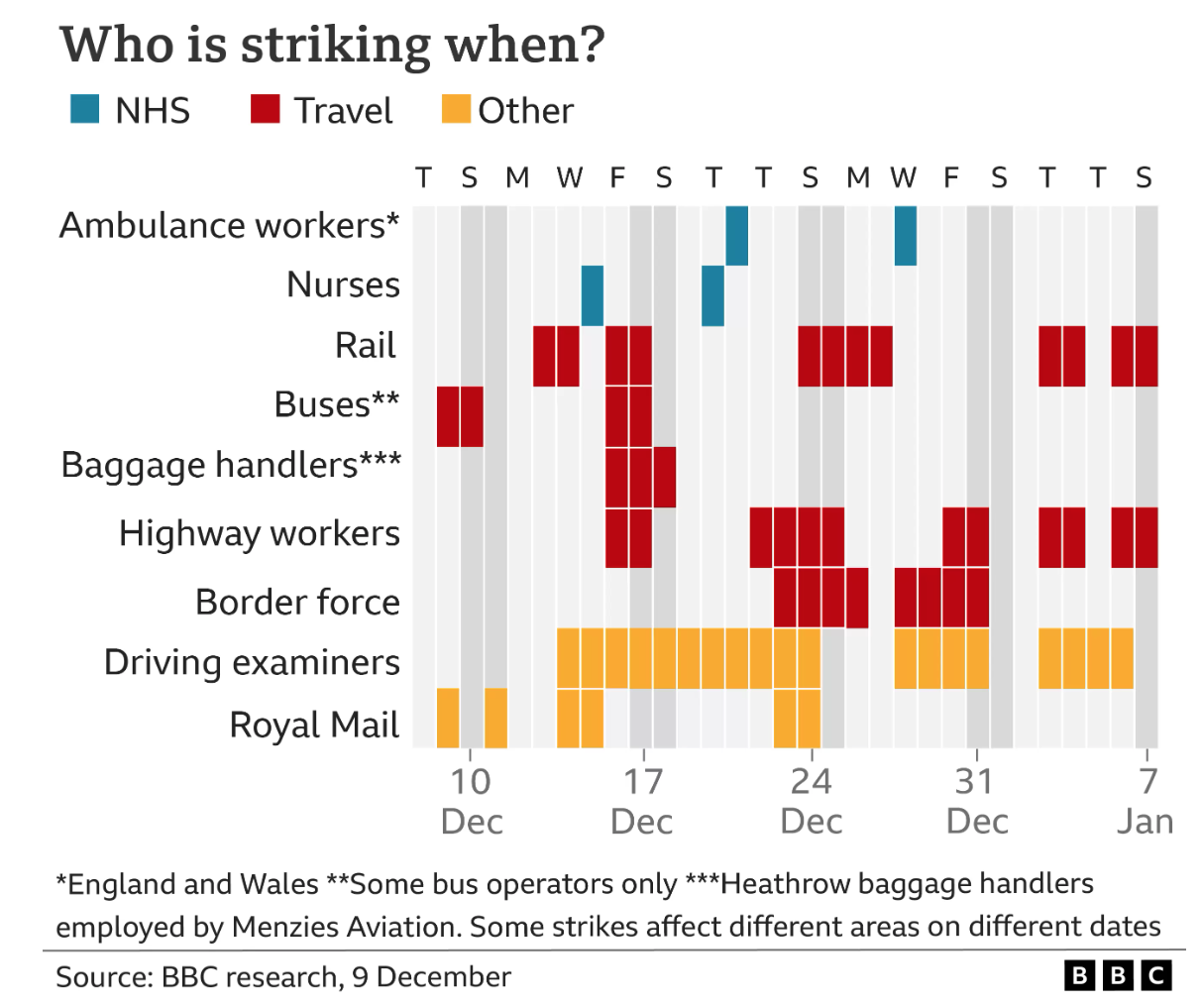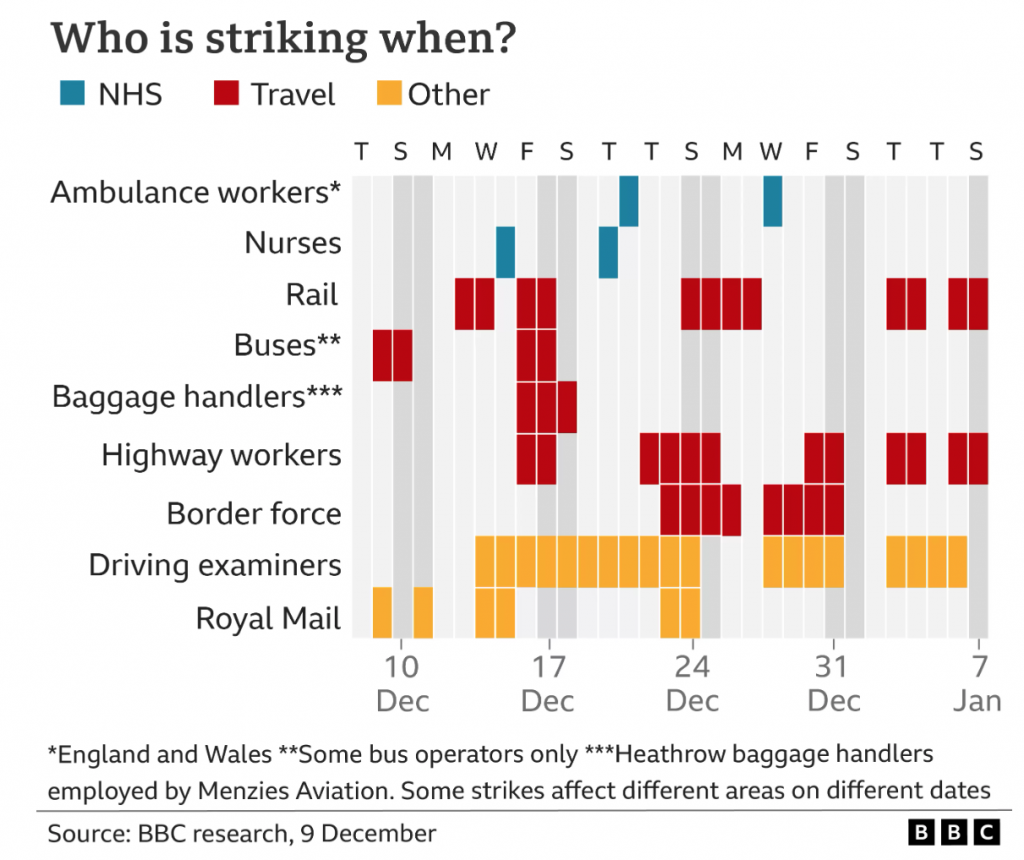A brief lull in the fighting?

On 1st of February 2023 half a million public sectors workers took part in strikes. These were the largest strikes in more than a decade. They included teachers, university workers, civil servants, train and bus drivers. Larger strikes by health workers were promised for the following week, including the first ever strike of mid-wives – who would still attend births – despite being on strike. Paramedics, ambulance staff and firefighters were all scheduled to strike in the following weeks. Many of the strikes had been on-going since 2022. At times it appeared that only the police and army had not been on strike. They were not permitted strike.
The number of strikes had grown so much that the BBC gave up trying to depict what was happening overall. The graph they produced in December 2022 became too complex to update later because there were so many more strikes by so many more workers in early 2023.

The first UK strikes of winter 2022/23
Source: BBC
One thing that few noticed at the time, was how quiet the right wing think tanks had become during this period. It was as if they knew that if they said anything, it would rebound on them. For a decade, these bodies had loudly rubbished suggestions that people should be concerned over whether they were paid enough to cover their basic costs, such as housing. They scoffed at the suggestion that the take of those paid the most was far too high, or that this was squeezing others’ wages. Below I’ll give a few examples of how they have changed their tune from what often preoccupied them during the last decade through to August 2022. I’ll begin with some of the comments they made on my work in the past.
In 2014 the ‘Head of Political Economy.’ at the Institute for Economic Affairs wrote that ‘A lot of nonsense is being written about the UK’s housing crisis. But Danny Dorling’s book “All that is solid. The great housing disaster” is easily the worst contribution so far.’[1] These kinds of comments came continuously, right through to a final flurry in August 2022, when this particular writer suggested that the ‘…left-wing writer, also frequently portrays “neoliberals” as a crossover between Ebenezer Scrooge and Hannibal Lecter.’[2] The comments then suddenly ceased. They ceased in the few turbulent weeks when the failed regime of Liz Truss and Kwasi Kwarteng came and went, when the strikes grew, and then the national tune changed abruptly.
Many other examples can be given of past vocal criticism of those who had mentioned low pay as a problem. In 2015, the ‘Head of Life Style Economics’ at the Institute for Economic Affairs complained about writing on the best-paid 1% and said: ‘It is not difficult to guess why left-wing writers in the UK have virtually abandoned the Gini coefficient in favour of focusing on the amount earned by the very richest.’[3] The Gini statistic is used to show that, other than Bulgaria, the UK is the most unequal country in Europe. But it was common then for these commentators to try to ridicule and cast doubt on any worry about inequality. The rise in this kind of criticism had begun in earnest in the years immediately after the book, “The Spirit Level” was published in 2009.
In 2017 the ‘Head of Life Style Economics’ (again) at the Institute for Economic Affairs (IEA) likened claims I and the charity Oxfam were making to what he called: “Karl Marx’s wretched immiseration theory”. He said: “I don’t think income inequality is very important, but those who do should acknowledge that it is now lower now (sic) than at any time since 1986.”[4] If you ignored the income of the top tenth of people and the least well-off tenth, then you could then make that claim that inequality has fallen, but you would only do that if you did not want people to know inequality overall had not declined. A year earlier, the IEA’s ‘Head of Life Style Economics’ had written: “It is no coincidence that the most vocal academics in the inequality debate – Richard Wilkinson, Thomas Piketty, Danny Dorling et al – are men of the left.”[5] He ignored the women writing on inequality, including Richard Wilkinson’s Spirit Level co-author, Kate Pickett.
In 2018 a Telegraph journalist, writing in the Institute for Economic Affairs blog pages, suggested that “…the old mercantilist fallacy that wealth is a zero-sum game abounds in contemporary politics, and in the work of economists…”[6] She did not mention the argument that many people could be so much wealthier if we only controlled the greedy; and that so many people are far more meaningfully wealthy – better housed, better educated, and healthier – in more equitable European countries.
It had become normal to expect to be accused of being fundamentally misguided if you suggested that Britain was not heading in the right direction. Of a book I wrote with Sally Tomlinson, titled ‘Rule Britannia: From Brexit to the end of Empire’ one reviewer in Spiked Magazine gave it the accolade of the ‘worst book ever’.[7] This was the third time in quick succession that a book I had written was labelled as the ‘worst book ever’ by a commentator associated with the Tax Payers’ Alliance, The Institute of Economic Affairs , Spiked Magazine, or the like.
So what are these think tanks saying today and how has their focus changed? On their blogs today there are now almost no mentions of inequality or of the strikes. At least none that I can find. Attacks on left-wing academics appear to have petered out, and these think tanks have less to say overall. Remarkably, the ‘Head of Life Style Economics’ at the Institute for Economic Affairs now critiques the current Conservative Prime Minster and Chancellor for not cutting taxes.[8] The ‘Head of Political Economy’ at that same body now writes blogs in which he wonders aloud if ‘…the main reason why nationalisation is so popular is that most people massively overestimate the profit margins in the industries in question.’[9] Incidentally, it is not the main reason. Most people would like the services to be run better and at a lower cost. Although the very high salaries of the privatized industries’ Chief Executives (and other senior staff) easily gives away just how much profit they do make, let alone any inspection of the dividends or rising wealth of shareholders, who now mostly live overseas.
Telegraph journalists in 2023 appear to spend less time talking up their impression of the merits of various Victorian era economic theories. They spend more time writing sketches about recently demoted Conservative Chancellors. However, often these show little foresight.[10] Now, instead of criticizing those who write about economic inequality, they more often speculate about cultural issues such Scottish policy on gender identity.[11] This Scottish policy was also the headline in Spiked Magazine a day after the Telegraph journalists’ piece.[12] In many ways this group acts like a herd while proclaiming the cult of the heroic isolated individual. Since August 2022 The Tax Payers’ alliance has turned its attention away from arguing that inequality was falling and towards trying to turn our focus to immigration, refugees, and those ‘small boats’.[13]
Why has the focus reverted to the obscure or to the old anti-immigration, anti-refuge, tropes? Part of the reason was the disastrous autumn statement of Kwasi Kwarteng who was doing exactly what Liz Truss wanted him to do. She in turn was doing exactly what the right wing think tanks had called for. All this ended in disaster. But another reason for the turn was the strikes, the general rise in unrest, anxiety, and anger. The lull in their commenting came at the very point that their ideas had been tried and failed, but caused great damage and further raised the basic costs of housing, fuel and food. They were, I think, hoping that few people who notice the part they had played in making the cost-of-living crises so much worse in the UK than it was elsewhere in Europe.
There is a phrase in football – you only sing when you’re winning. Hopefully this is more than just a lull.
For the original place of publication of this article and a PDF copy click here.
References
1. Niemietz, K. (2014) Danny Dorling’s ‘All that is solid’: The worst book on the housing crisis so far, Institute for Economic Affairs, 4 July.
2. Niemietz, K. (2022) Politically active left-wingers are the equivalent of the tribal football fan, 1828 blog, 31 August,
3. Snowdon (2015) The rich versus the super-rich, Institute for Economic Affairs, 16 February.
4. Snowdon, C (2017) How Danny Dorling (and Oxfam) recycle Karl Marx’s wretched ‘immiseration theory’, Institute for Economic Affairs, 20 January.
5. Snowdon, C. (2016) Is envy of the super-rich by the rest of the rich driving the inequality debate?, Institute for Economic Affairs, 25 May.
6. Grant, M. (2018) Ricardo’s ideas are as indispensable today as they were 200 years ago, Institute for Economic Affairs, 19 April.
7. Butcher, J. (2019) Is this the worst book written about Brexit? Spiked Magazine, 28 March.
8. Snowdon, C. (2022) Big Government, Big Borrowing and Big Inflation are probably here to stay, Institute for Economic Affairs, 8 December.
9. Niemietz, K. (2022) The economics and politics of nationalisation and privatisation, Institute for Economic Affairs, 2 December.
10. Grant, M. (2023) Crestfallen press pack fails to land scalp… or shiny forehead, The Telegraph, 25 January.
11. Grant M. (2023) Sturgeon’s gender ideology is imploding in real time, The Telegraph, 31 January.
12. Macwhirter (2023) Sturgeon’s trans crusade could be her undoing, Spiked Magazine, 1 February.
13. Protheroe, C. (2023) There is no quick fix to small boats, TaxPayers’ Alliance, 21 January.